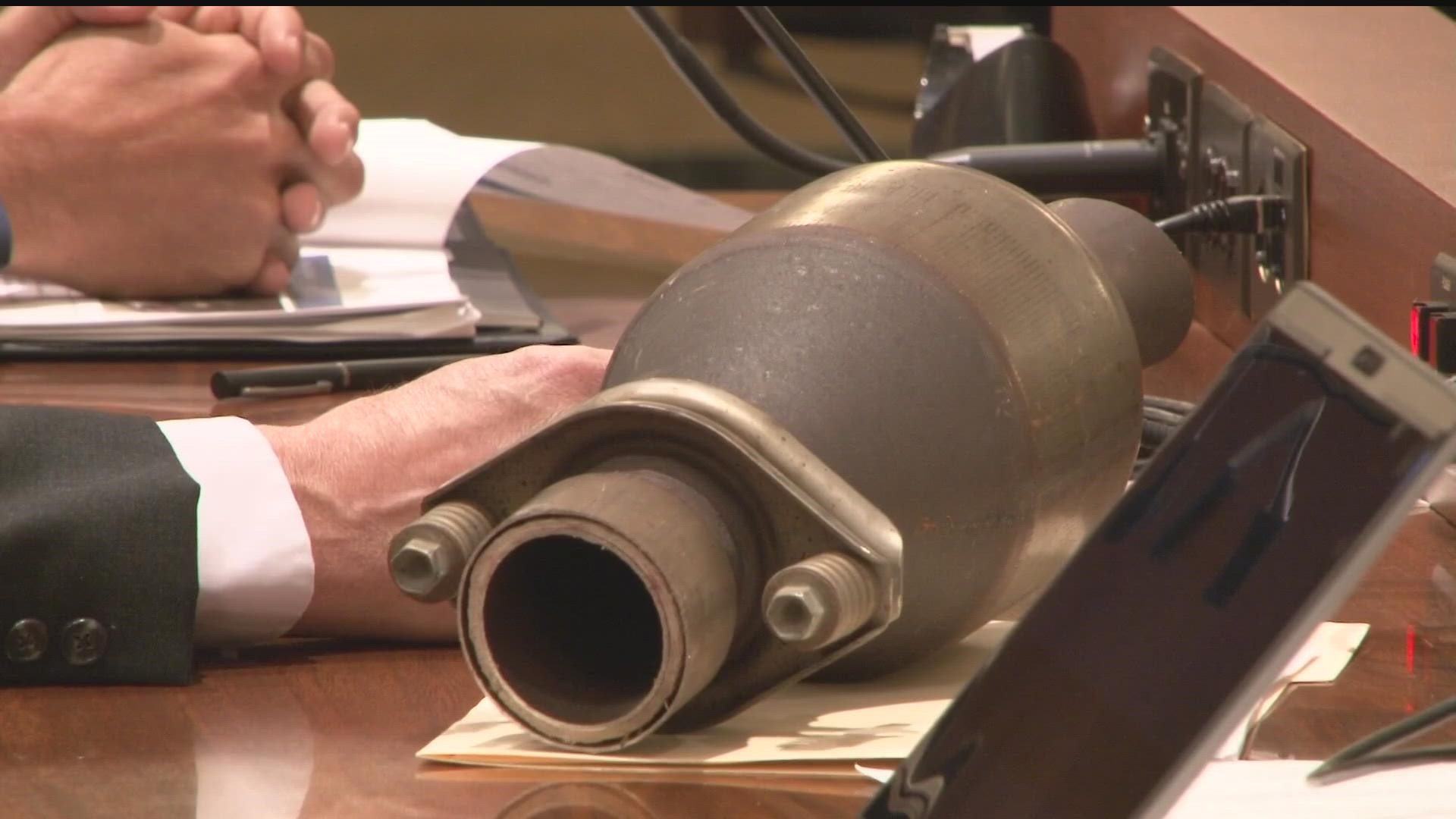ST PAUL, Minn. — Senate Democrats and Republicans have launched a new slate of consumer protection bills, designed to shield Minnesotans from catalytic converter thieves, prescription medication price gouging, and annoying phone calls from shady operators.
"I think every single Minnesotan has been affected by these issues," Sen. Matt Klein, a Mendota Heights Democrat and medical doctor, told reporters Tuesday.
"You’ve either spent too much for your kid’s epinephrine pen, or you’ve had your catalytic converter stolen. And virtually everyone has had a robocall."
Sen. John Marty's Senate File 5 would require anyone who removes a catalytic converter from a car to put the vehicle identification number, or VIN, on that piece so it can be traced to the vehicle it matches. Anyone in possession of an unmarked catalytic converter could be charged with a crime.
"We would make it a crime to possess a used catalytic converter that's not attached to a car that doesn't have the vehicle identification number on it," Marty, a Roseville Democrat, told the Senate Commerce and Consumer Protection Committee during a hearing Tuesday.
He held up a sawed-off catalytic converter at the witness table, pointing out that the precious metals in that exhaust-cleaning part are worth 12 times the price of gold.
"You don't have to label the part if it's still on your car. But you take it off the car, it's got to be labeled."
Ramsey County Attorney John Choi, speaking for himself and the Minnesota County Attorneys Association, said Marty's bill would make it much easier to prosecute people who can currently make up excuses for why they're driving around with multiple catalytic converters and portable metal saws in their vehicles.
Carrie Peltier, a St. Paul resident, testified in support of the bill. Her father-in-law's catalytic converter was stolen when he came to Minnesota from Indiana for Thanksgiving in 2021.
"He had to leave his car here in Minnesota; had to buy a plane ticket and fly back to Indiana; had to rent a car for three months," Peltier recalled.
"All told, it cost him more than $4,000. And then we had to drive his car back to Indiana after it was repaired."
St. Paul Police Commander Kurt Hallstrom said Marty's bill, if it were to become law, would give officers a new tool at a time when that type of crime is soaring. It's an act that happens so fast most victims never see the thieves.
"With these battery-operated saws, technology has made it very easy for them to quickly cut these off," Hallstrom explained.
"I really like this bill because it makes possession of a catalytic converter contraband, such as a gun or drugs."
This type of theft is more widespread than official crime stats would show, according to Minnesota Commerce Department special investigator Joe Boche. He estimates the total number of cat converter thefts at 100,000 per year.
"The very, very large majority of these are not being reported to law enforcement, and are not being reported to insurance companies," Boche told lawmakers.
"Minnesota, unfortunately, is the third largest state in the nation for catalytic converter theft behind California and Texas."
Boche said the bill would help because most black-market buyers and street-level converter thieves don't want to buy marked converters because they're harder to sell to metal scrappers.
Jeremy Estenson, a lobbyist who appeared on behalf of the Institute of Scrap Recycling Industries, said the scrapping industry supports any legislation to crack down on theft. But he predicted Marty's bill won't have much impact on thieves who sell those stolen parts outside of the state's borders.
"To ask them to put VIN numbers on a catalytic converter they intend to take out of Minnesota doesn’t feel as though it’s going to do much to slow the actual crime rate."
Estenson said the scrap metal industry is already under strict record-keeping rules, due to bills passed in 2012 to crack down on copper pipe thefts.
Boche pushed back a bit, saying many of the Minnesota thieves meet with local black-market operators within 24 hours, so they can get quick cash to feed their drug habits.
Robocalls bill
The committee gave initial approval to the bill and another one from Sen. Rich Draheim that would raise the fines for robocall operators.
"There are over 50 billion robocalls a year here in the United States," Draheim, a Madison Lake Republican, explained.
"People are accustomed to not answering their phones. Only 19% of adults answer their phones. Nineteen percent. In case of emergency, someone could really need help."
He said he recognizes most robocalls are coming from overseas, but he says Minnesota needs to send a message that violators will be hit in the pocketbook. Draheim's bill would raise the civil fines for illegal robocall operators to $100,000 from the current $25,000.
Later this week, lawmakers will take up Sen. Kelly Morrison's drug price gouging bill, which would establish a Prescription Drug Affordability Board.
"No one with a chronic condition, cancer or other health issues should lose their life or health because the drug was priced too high," Sen. Morrison, a Deephaven Democrat and physician, told reporters Tuesday.
"If you think about it, the high cost of prescription drugs affects all of us. We all pay the cost through our health insurance premiums at the pharmacy, and through the toll on our public health when people can’t afford the medicine they need."

